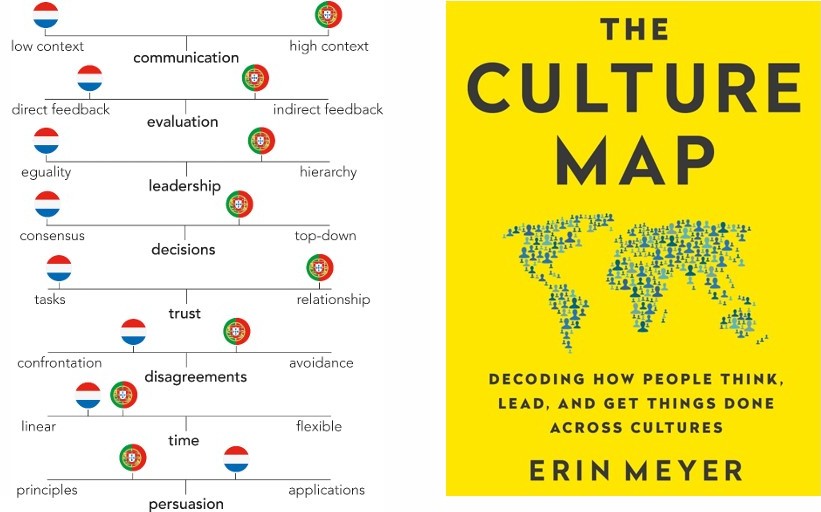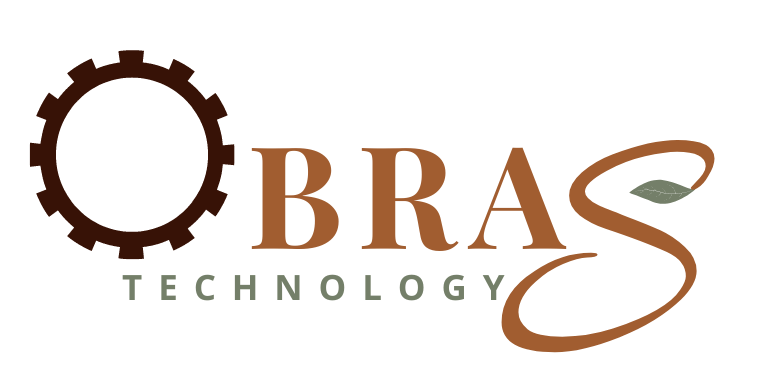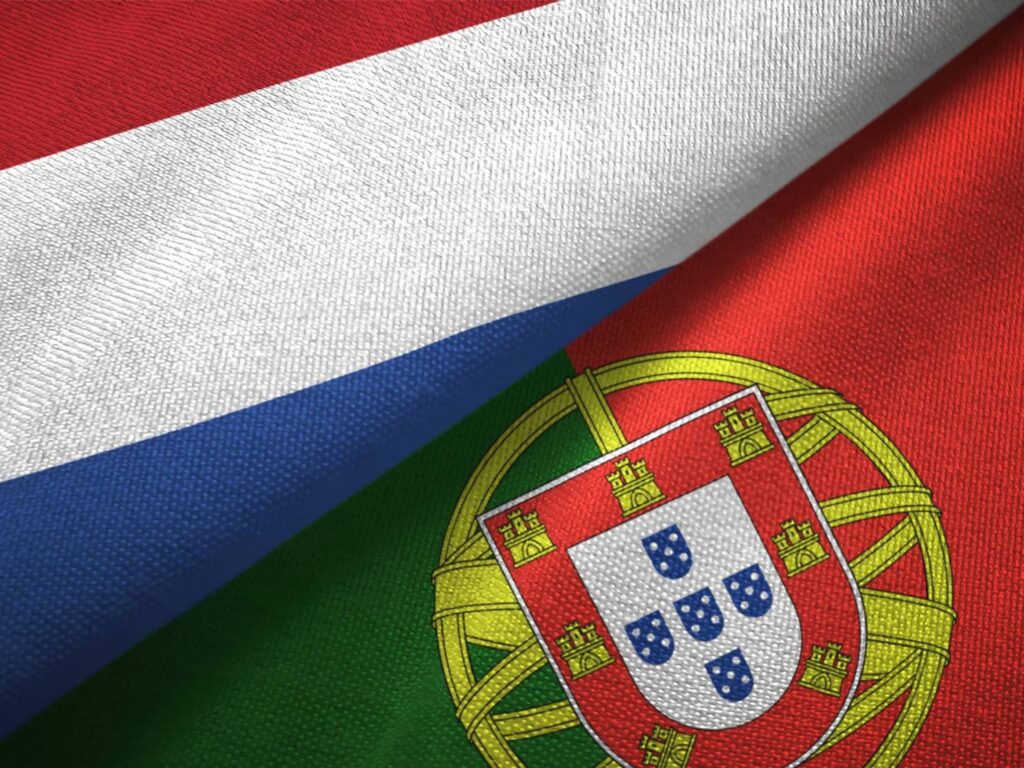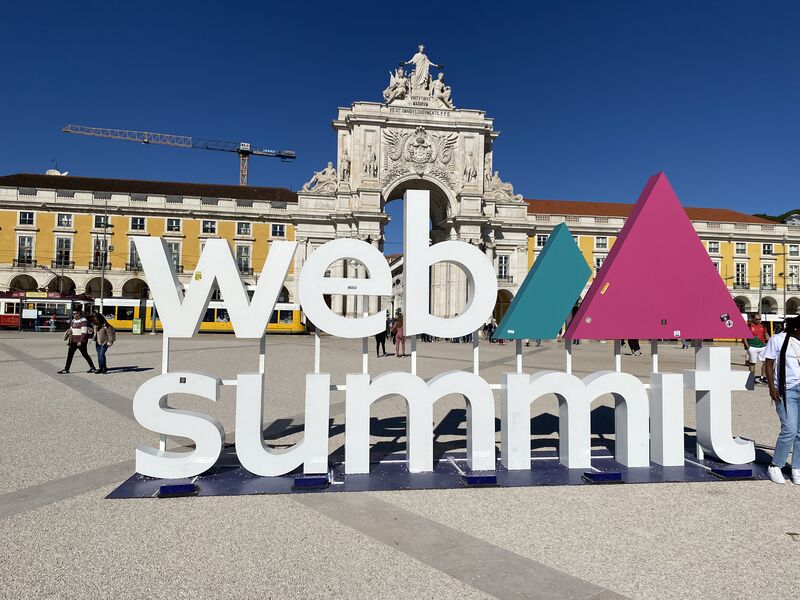When Dutch directness meets Portuguese warmth, sparks fly – and not always in ways you’d expect. Understanding cultural differences between Portugal and The Netherlands is crucial for succes in nearshore projects.
Culture mapping Portugal and the Netherlands
Drawing from Erin Meyer’s influential work “The Culture Map,” we gathered a bunch of Dutch and Portuguese professionals to map out our cultural DNA. Our goal was simple: identify key differences and similarities to help us have a meaningful dialogue. The resulting Dutch-Portuguese cultural map offers valuable insights that are interesting for nearshoring projects and people looking to do business in both ccountries.

Communication: Direct vs. Indirect
When Dutch and Portuguese colleagues meet, their contrasting communication styles often create an intriguing dynamic. Portuguese communication weaves a subtle tapestry, where meaning often lies between the lines. Nonverbal cues, such as a raised eyebrow, a slight pause, or a careful choice of words carry as much weight as the words themselves. Context is key and messages can have many nuanced layers. The Dutch approach stands in stark contrast. Their communication style cuts straight to the point – crystal clear, context-free and leaves no room for ambiguity. They “tell it like it is” to speak with talk show host Wendy Williams. Understanding these cultural distictions in between Portugal and The Netherlands is crucial for a succesful discourse in nearshore projects.
Evaluation: Transparancy vs. Care
When the Portuguese give feedback, they exercise diplomacy. People choose their words carefully to preserve relationships and maintain harmony. A Portuguese colleague wraps critique in layers of politeness. for a Dutch audience this often times creates confusion, resulting in mistrust. What is actually going on? Dutch evaluations, by contrast, embody transparency in its purest form. This unvarnished approach, while efficient, can create cultural friction. What Dutch colleagues see as “helpful directness” might land as startlingly blunt to their Portuguese counterparts. The Dutch straightforward feedback style is well-intentioned, but can easily be misinterpreted as a complete lack of social grace. At times, when they see that direct feedback is taken personally by other cultures, the Dutch will try to correct themselves and give feedback in a more indirect or polite manner. But instead of bringing clarity this often leads to total confusion between parties. The key to succes is finding a balance between transparancy and courtesy. In this light, it is essential to confirm your understanding by summarising the conversation.

Leadership: Equality vs. Hierarchy
In Portuguese corporate culture, leadership follows more traditional contours. In a hierarchical structure employees often show careful respect for authority en seniority. The practice of questioning leadership decisions openly is less common. The Dutch workplace presents a striking alternative. Here, decision-making resembles more of a “roundtable discussion / debate”. In this work culture, employees at all levels are expected to voice their opinions openly. The familiar Dutch phrase “zeggen waar het op staat” captures this cultural emphasis on open dialogue. The endresult is a consensus decision. In nearshore projects striking the right balance between cultural differences in leadership styles is a challenge worth tackling.
Decision-Making: Group vs. Leader
In Portugal, corporate decision-making follows a top-down approach. It reflects the country’s traditional leadership style. Senior leaders are expected to make key decisions independently. As a result, seniors less often openly consult lower-ranking employees. This stands in contrast to the Netherlands, where a collaborative approach is emphasized. The Dutch workplace culture values group consultation and consensus-building. This is the (in-)famous “poldermodel”. Workers of all levels voice their opinions openly. This is a practice referred to as “tegenspraak” (constructive dissent). The goal is to make informed decisions. Thinking about implementing group decision-making? It can be tricky. But done right, it gets you a decision that everyone actually backs and will help you achieve results in your nearshore project faster.

Trust: Tasks vs. Relationship
Trust in the Netherlands is built through reliability and consistency in delivering work. Meeting expectations regarding quality and deadlines is the foundation. While relationships may appear to play a less important role, they are still important. A brief coffee break and casual conversation before a meeting—however short—are essential moments for fostering trust among colleagues. In Portugal trust in business is deeply rooted in personal relationships. Before engaging in professional collaborations, people prefer to establish a sense of familiarity and mutual confidence. This is where informal business lunches play a key role, serving as opportunities to strengthen connections. Understanding these subtle variations between Portugal and The Netherlands enables succes in nearshore projects.
Disagreements: Confrontation vs. Avoidance
In general Portuguese tend to avoid open disagreement. In both professional and social settings, individuals are discrete. Portuguese careful navigate disagreements in a way that minimizes the risk of offending others. Discussions are diplomatic with an emphasis on preserving the relationship. Dutch will approach a disagreement more forthright. The Dutch will express their opinions openly. They will address conflicts head-on with less (or no) regard for the social context. Dutch people value transparency as a key aspect in communication. While this attitude may come across as blunt and arrogant, it is rooted in a belief that honesty leads to clarity and efficiency. When dealing with conflicts, it helps to be aware of our own cultural tendencies and adapt to the others’ style. It can be a powerful tool to navigate conflict smoothly, especially when a team is under pressure.

Time: Linear vs. Flexible
Portuguese approach time with a degree of flexibility. Arriving 15 to 20 minutes late to a business meeting is not uncommon. In the Netherlands, punctuality is seen as a sign of respect. Most Dutch professionals aim to arrive a few minutes early for meetings, and discussions are expected to conclude on time. In their personal lives, the Dutch tend to follow structured schedules, often planning social engagements well in advance (think weeks or months). Spontaneous visits, unplanned gatherings and meals with family and friends—very common in Portugal—are far less typical in the Netherlands. The solution is very simple: we advise Dutch to be a bit more flexible and sponteanous, while we tell Portuguese to be more timely and more focussed on keeping deadlines.
Persuasion: Practical vs. Theoretics
Portuguese professionals navigate through conceptual waters first. This reflects a deep-seated need to understand the “complete picture”. This approach prioritizes understanding the “why”. It creates a comprehensive framework before Portuguese dive into specifics. Dutchies, meanwhile, base their arguments on generic facts and data, before quickly moving to practical solutions. This pragmatic approach reflects a cultural preference for efficiency. Dutch people like to identify the “what” and swiftly determine the “how”, so the problem is solved. Both cultures can benefit from each other, by taking the best of both. Taking a bit more time to fully understand the issues at hand, does not mean you cannot act swiftly to tackle the problems and create succes.
Bridging the Gap
This culture map paints a revealing picture: Portuguese business culture values relationship-building, hierarchical respect and nuanced communication. This creates an interesting contrast with the Dutch preference for egalitarian structures, punctuality and transparent exchanges. Understanding these inherent differences and even embracing them, allows teams to build bridges rather than stumble over cultural gaps. In every nearshore project it is important to an understand personal styles and cultural backgrounds. Make sure you are aware of these differences and to always check your assumptions, before taking it for a fact. And very important: enjoy the ride! Doing business with multiple cultures enriches your professional life.
Understanding cultural differences between Portugal and The Netherlands is crucial for succes in nearshore projects! At Obras Technology we are available to help you understand cross cultural differences. Our goal is to help you improve and expand your business with the best nearshore partners. Interested in finding out more? Contact us!




